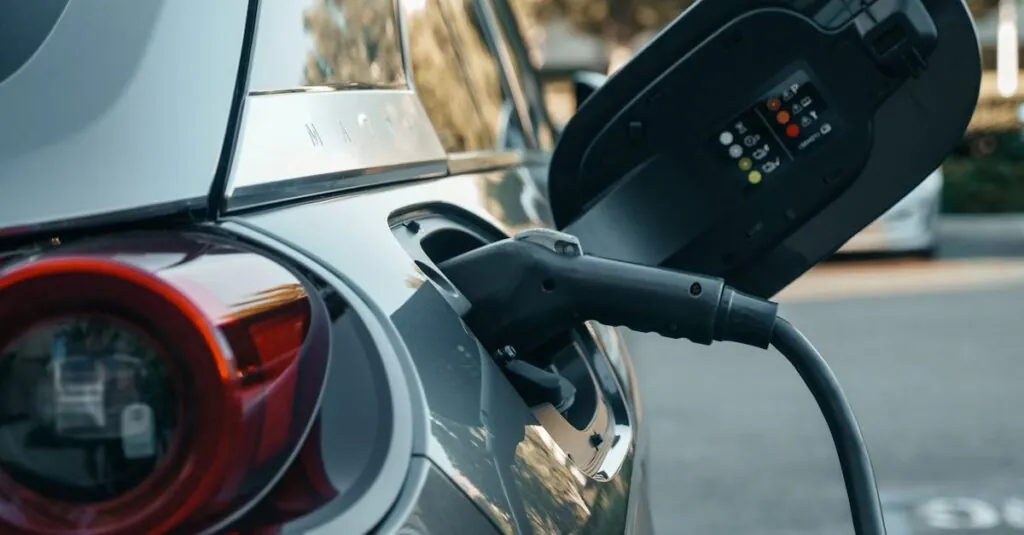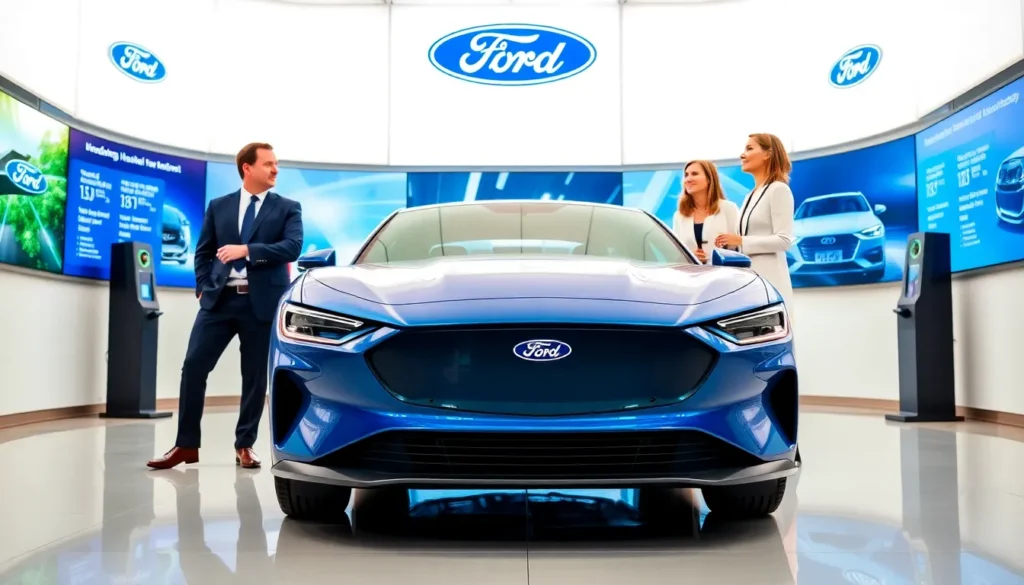Table of Contents
ToggleAs the world shifts towards greener energy solutions, smart EV chargers are taking the spotlight. Imagine a device that not only charges your electric vehicle but also knows when to draw power at the most economical rates. It’s like having a personal assistant for your car—minus the coffee runs!
These innovative chargers are designed to make life easier and more efficient. With features like scheduling, remote access, and energy monitoring, they’re not just smart; they’re downright genius. Say goodbye to the days of waiting impatiently at the charging station. Instead, let your charger do the heavy lifting while you kick back and enjoy a little “me time.” Embracing smart EV charging is not just a step toward sustainability; it’s a leap into the future of convenience and cost savings.
Overview of Smart EV Chargers
Smart EV chargers play a crucial role in the efficiency of electric vehicle charging. They allow users to charge their vehicles during off-peak hours, significantly reducing energy costs. By integrating with smartphone applications, these chargers provide remote access for users to monitor charging sessions in real-time.
Convenient features such as scheduling ensure charging occurs at the most favorable times, aligning with user routines. Energy monitoring capabilities give insights into consumption, helping users make informed decisions about charging and savings. Charging rates can vary, so understanding these differences aids in maximizing cost-effectiveness.
In addition, many smart chargers offer compatibility with renewable energy sources, like solar panels. This feature enhances sustainability and allows users to charge their vehicles with clean energy. Users can also benefit from upgrade options that allow integration with home energy management systems, boosting energy efficiency further.
Enhanced security configurations ensure safe access and protect users from unauthorized tampering. Charging data can also be compiled for analysis, assisting in the optimization of future charging habits. Overall, smart EV chargers represent a significant leap toward more efficient and environmentally friendly vehicle charging solutions.
Key Features of Smart EV Chargers
Smart EV chargers come with a range of features that enhance user experience and promote sustainability.
Connectivity Options
Connectivity options are crucial for smart EV chargers. Wi-Fi and Bluetooth enhancements allow seamless integration with smartphones and home networks. Users can access their charging data from anywhere, making it easy to monitor sessions in real-time. Many chargers support compatibility with smart home systems, enabling centralized control through voice commands or apps. Also, some models offer cellular connections for areas with limited Wi-Fi access, ensuring users stay connected regardless of location.
Charging Speed and Efficiency
Charging speed and efficiency stand out as vital attributes of smart EV chargers. Level 2 chargers typically deliver power at rates of 3.7 to 22 kW, significantly reducing charging time compared to standard Level 1 chargers. Users can expect full charges in just a few hours, depending on their vehicle’s capacity. Efficient energy management systems calculate optimal charging times based on electricity rates. By utilizing off-peak hours, users can take advantage of lower energy costs while minimizing strain on the power grid. Enhanced energy efficiency aligns with green energy goals, making charging sustainable and economical.
Benefits of Using Smart EV Chargers
Smart EV chargers offer multiple advantages that enhance the user experience and contribute to eco-friendly practices.
Cost Savings
Cost efficiency stands out as a primary benefit of smart EV chargers. Users can charge during off-peak hours, often resulting in reduced electricity rates. Significant savings occur when taking advantage of lower energy prices typically available late at night or early in the morning. Monitoring usage data empowers users to analyze charging habits and tweak them for optimal savings. Financial incentives from utility companies can further minimize operational costs. Additionally, many smart chargers set preferences to avoid peak demand charges, leading to more predictable monthly energy expenses.
Environmental Impact
The environmental benefits of smart EV chargers cannot be overlooked. Charging with renewable energy sources, like solar, helps reduce carbon footprints significantly. Smart chargers effectively manage energy consumption, ensuring that they operate when the grid relies more on clean energy. Their integration with home solar systems supports the transition to greener energy solutions. By facilitating reduced greenhouse gas emissions, these chargers contribute to mitigating climate change. Users with sustainable charging habits actively participate in promoting cleaner air and a healthier planet through responsible energy choices.
Popular Smart EV Charger Models
Numerous smart EV charger models cater to diverse user needs. Level 2 chargers like the ChargePoint Home Flex offer adjustable power settings, allowing users to optimize charging speed from 16 to 50 amps, effectively reducing charging time. Wallbox Pulsar Plus stands out for its compact size and powerful output, providing up to 40 amps of charging power while supporting both Wi-Fi and Bluetooth connectivity.
The JuiceBox Pro 40 also gains attention due to its compatibility with smart home systems and features like energy monitoring. With a 40-amp output, it delivers efficient charging while users can manage sessions through a smartphone app. Offering various integration options, the Enphase IQ Charger enhances the user experience by connecting seamlessly to solar energy systems and promoting eco-friendly energy use.
Tesla Wall Connector remains a popular choice among Tesla owners. It provides a charging rate of up to 48 amps, facilitating rapid charging catered specifically to Tesla vehicles. Users appreciate its design, which integrates well with home charging setups.
The Bosch Level 2 EV Charger claims attention due to its durability and simplicity. Rated at 30 amps, it supports a straightforward, user-friendly interface while ensuring reliable, efficient charging for various electric vehicle brands.
Consideration for space and aesthetics leads many to opt for the Eve Mini. Compact and stylish, this charger delivers up to 22 kW while supporting various smart home integrations. These popular smart EV charger models showcase advancements in technology, efficiency, and user-friendly features, catering to the growing demand for sustainable energy solutions.
Installation Considerations
Selecting a suitable location for a smart EV charger is crucial. Proximity to the vehicle’s parking space reduces cable length and makes charging convenient. A dedicated electrical circuit may be necessary for proper functionality, ensuring safety and efficiency during charging sessions.
Local building codes and regulations play an important role. They dictate electrical installations and may require inspections or permits. Consulting a licensed electrician helps navigate these requirements, ensuring compliance and optimal installation.
Assessing electrical capacity is vital. Homeowners should evaluate their electrical system’s amperage and voltage to support the added load. Upgrading service panels or electrical wiring may become necessary in some cases.
Weatherproofing becomes essential for outdoor installations. Smart chargers designed for outdoor use withstand harsh conditions, protecting them from moisture and debris. Proper mounting on stable surfaces ensures durability and safety.
Accessibility features are key for user experience. Positioning the charger within easy reach allows for effortless connection of the vehicle. Incorporating user-friendly interfaces enhances convenience, making the charging process intuitive.
Compatibility with existing home systems requires attention. Many smart EV chargers integrate seamlessly with smartphones and smart home ecosystems. Ensuring reliable Wi-Fi connectivity also aids in accessing charger features and real-time monitoring.
Lastly, future scalability should not be overlooked. Planning installations with potential expansion in mind can accommodate additional electric vehicles. This forward-thinking approach ensures the system adapts to evolving energy needs.
Smart EV chargers are revolutionizing the way electric vehicles are powered. By offering advanced features like scheduling and remote access, they not only enhance user convenience but also promote significant cost savings. Their compatibility with renewable energy sources further underscores their role in fostering a sustainable future.
As the demand for electric vehicles continues to grow, the importance of efficient and intelligent charging solutions becomes even more apparent. Investing in a smart EV charger is a step towards smarter energy management and a greener planet. Embracing this technology allows users to contribute to environmental sustainability while enjoying a seamless charging experience.




